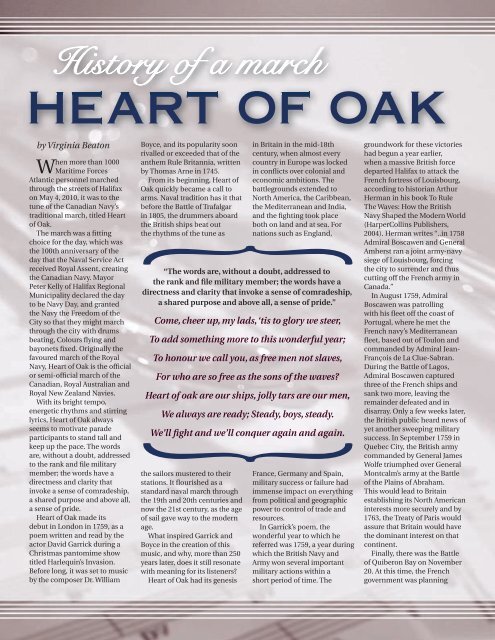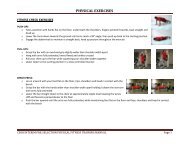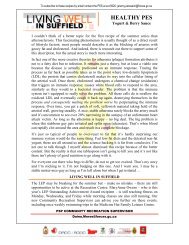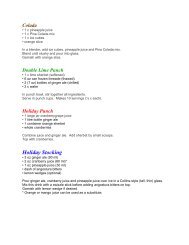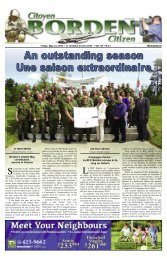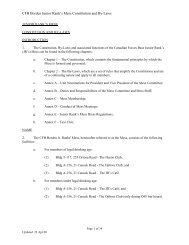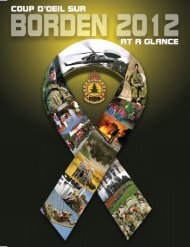We Care!
We Care!
We Care!
You also want an ePaper? Increase the reach of your titles
YUMPU automatically turns print PDFs into web optimized ePapers that Google loves.
History of a march<br />
Heart of oak o<br />
by Virginia Beaton<br />
When more than 1000<br />
Maritime Forces<br />
Atlantic personnel marched<br />
through the streets of Halifax<br />
on May 4, 2010, it was to the<br />
tune of the Canadian Navy’s<br />
traditional march, titled Heart<br />
of Oak.<br />
The march was a fitting<br />
choice for the day, which was<br />
the 100th anniversary of the<br />
day that the Naval Service Act<br />
received Royal Assent, creating<br />
the Canadian Navy. Mayor<br />
Peter Kelly of Halifax Regional<br />
Municipality declared the day<br />
to be Navy Day, and granted<br />
the Navy the Freedom of the<br />
City so that they might march<br />
through the city with drums<br />
beating, Colours flying and<br />
bayonets fixed. Originally the<br />
favoured march of the Royal<br />
Navy, Heart of Oak is the official<br />
or semi-official march of the<br />
Canadian, Royal Australian and<br />
Royal New Zealand Navies.<br />
With its bright tempo,<br />
energetic rhythms and stirring<br />
lyrics, Heart of Oak always<br />
seems to motivate parade<br />
participants to stand tall and<br />
keep up the pace. The words<br />
are, without a doubt, addressed<br />
to the rank and file military<br />
member; the words have a<br />
directness and clarity that<br />
invoke a sense of comradeship,<br />
a shared purpose and above all,<br />
a sense of pride.<br />
Heart of Oak made its<br />
debut in London in 1759, as a<br />
poem written and read by the<br />
actor David Garrick during a<br />
Christmas pantomime show<br />
titled Harlequin’s Invasion.<br />
Before long, it was set to music<br />
by the composer Dr. William<br />
Boyce, and its popularity soon<br />
rivalled or exceeded that of the<br />
anthem Rule Britannia, written<br />
by Thomas Arne in 1745.<br />
From its beginning, Heart of<br />
Oak quickly became a call to<br />
arms. Naval tradition has it that<br />
before the Battle of Trafalgar<br />
in 1805, the drummers aboard<br />
the British ships beat out<br />
the rhythms of the tune as<br />
in Britain in the mid-18th<br />
century, when almost every<br />
country in Europe was locked<br />
in conflicts over colonial and<br />
economic ambitions. The<br />
battlegrounds extended to<br />
North America, the Caribbean,<br />
the Mediterranean and India,<br />
and the fighting took place<br />
both on land and at sea. For<br />
nations such as England,<br />
{{<br />
“The words are, without a doubt, addressed to<br />
the rank and file military member; the words have a<br />
directness and clarity that invoke a sense of comradeship,<br />
a shared purpose and above all, a sense of pride.”<br />
Come, cheer up, my lads, ‘tis to glory we steer,<br />
To add something more to this wonderful year;<br />
To honour we call you, as free men not slaves,<br />
For who are so free as the sons of the waves?<br />
Heart of oak are our ships, jolly tars are our men,<br />
<strong>We</strong> always are ready; Steady, boys, steady.<br />
<strong>We</strong>’ll fight and we’ll conquer again and again.<br />
the sailors mustered to their<br />
stations. It flourished as a<br />
standard naval march through<br />
the 19th and 20th centuries and<br />
now the 21st century, as the age<br />
of sail gave way to the modern<br />
age.<br />
What inspired Garrick and<br />
Boyce in the creation of this<br />
music, and why, more than 250<br />
years later, does it still resonate<br />
with meaning for its listeners?<br />
Heart of Oak had its genesis<br />
France, Germany and Spain,<br />
military success or failure had<br />
immense impact on everything<br />
from political and geographic<br />
power to control of trade and<br />
resources.<br />
In Garrick’s poem, the<br />
wonderful year to which he<br />
referred was 1759, a year during<br />
which the British Navy and<br />
Army won several important<br />
military actions within a<br />
short period of time. The<br />
groundwork for these victories<br />
had begun a year earlier,<br />
when a massive British force<br />
departed Halifax to attack the<br />
French fortress of Louisbourg,<br />
according to historian Arthur<br />
Herman in his book To Rule<br />
The Waves: How the British<br />
Navy Shaped the Modern World<br />
(HarperCollins Publishers,<br />
2004). Herman writes “..in 1758<br />
Admiral Boscawen and General<br />
Amherst ran a joint army-navy<br />
siege of Louisbourg, forcing<br />
the city to surrender and thus<br />
cutting off the French army in<br />
Canada.”<br />
In August 1759, Admiral<br />
Boscawen was patrolling<br />
with his fleet off the coast of<br />
Portugal, where he met the<br />
French navy’s Mediterranean<br />
fleet, based out of Toulon and<br />
commanded by Admiral Jean-<br />
François de La Clue-Sabran.<br />
During the Battle of Lagos,<br />
Admiral Boscawen captured<br />
three of the French ships and<br />
sank two more, leaving the<br />
remainder defeated and in<br />
disarray. Only a few weeks later,<br />
the British public heard news of<br />
yet another sweeping military<br />
success. In September 1759 in<br />
Quebec City, the British army<br />
commanded by General James<br />
Wolfe triumphed over General<br />
Montcalm’s army at the Battle<br />
of the Plains of Abraham.<br />
This would lead to Britain<br />
establishing its North American<br />
interests more securely and by<br />
1763, the Treaty of Paris would<br />
assure that Britain would have<br />
the dominant interest on that<br />
continent.<br />
Finally, there was the Battle<br />
of Quiberon Bay on November<br />
20. At this time, the French<br />
government was planning


